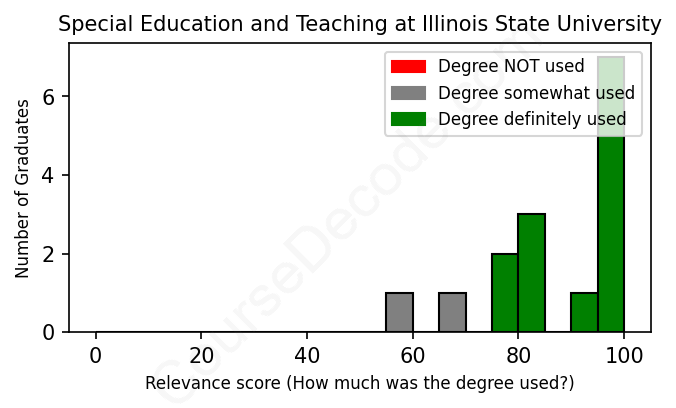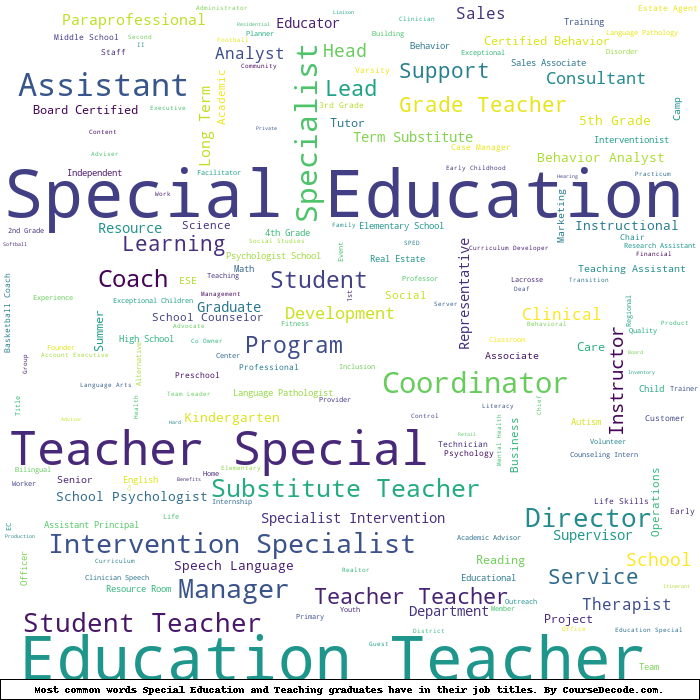
First, some facts. Of the Special Education and Teaching graduates from Illinois State University we've analyzed , here's how many have used (or NOT used) their degree in their career:

These are estimates based on AI analysis of 15 LinkedIn profiles (see below).
The verdict? Significantly above average. Overall, with an average relevance score of 87%, Special Education and Teaching graduates from Illinois State University have a much higher likelihood (+20%) of finding work in this field compared to the average graduate across all fields:
And for comparison, here's the chart for all profiles we've looked at across all degrees.
Also, after graduating, 60% of these graduates have pursued further education other than another Bachelor's degree (such as a Masters degree or other), compared to the average across all profiles of 35%. This suggests you may need more than just a Bachelors degree to be competitive as a Special Education and Teaching graduate.
See the details:
|
Relevance score: 100% We think this person has gone into a career highly relevant to their degree. We think this person has gone into a career highly relevant to their degree.
DEGREE INFOGraduated in 2020 from Illinois State University with a Bachelor of Science - BS in Special Education and Teaching. No other secondary education since. JOB HISTORY SINCE GRADUATIONSpecial Education Teacher LISLE CUSD 202 SCHOOL DISTRICT Dec 2020 - Jun 2021 Special Education Teacher  School District U-46 May 2021 - Present ABOUTNo information provided. |
The top 10 most common jobs done by the graduates we've analyzed (ranked most common to least) are:
When looking at the jobs held by graduates with a degree in Special Education and Teaching from Illinois State University, you'll notice a pretty clear trend: many of them go into various roles directly related to special education. Positions like Special Education Teacher and Learning & Behavior Specialist pop up frequently, showcasing that these folks are using their skills in real, impactful ways with students who have unique learning needs. What's great is that in nearly all cases, these roles draw heavily from the knowledge and techniques learned during their college education, which is super relevant to their job responsibilities.
However, there are some exceptions. A few graduates have taken roles that aren't tightly connected to special education, like some administrative positions or roles in child development that don't fully utilize their specialized training. For example, jobs like Client Services Representative or Account Executive show that not all paths taken after graduation stick to the special education field. But overall, if you look at the majority of these job titles, it’s clear that most graduates are finding roles where they can make a difference in the lives of students who need that extra support, staying true to the essence of their degree!
Here is a visual representation of the most common words in job titles for Special Education and Teaching graduates (this is across all Special Education and Teaching graduates we've analyzed, not just those who went to Illinois State University):

Graduates from Illinois State University with a degree in Special Education and Teaching typically start their careers in direct educational roles, primarily as teachers or paraprofessionals. For many, the first job right after graduation is often as a Special Education Teacher or a Special Education Paraprofessional at various school districts. This initial role gives them hands-on experience working with students who have different needs, and many stay in teaching roles for several years. Over time, some of these educators transition into positions with more responsibility, such as coordinators, assistant principals, or even directors of special education. For instance, several graduates from the class of 2012 have progressed from teaching roles to higher administrative positions within the same school districts, illustrating a clear path of growth and leadership in the field.
Looking further down the line, around five to ten years post-graduation, many of these graduates remain within the education system, often taking on specialized roles that apply their expertise in special education. Some have shifted significantly, like the alumni who moved into client services or business process roles, which suggests that not everyone sticks strictly to education. However, the majority continue to build their careers within educational institutions, advancing into administrative positions or into related services, such as mobile crisis response or clinical roles in behavioral health. Overall, while there are a few outliers who change fields entirely, most graduates maintain focus on special education, leading to meaningful careers that impact the lives of students with diverse learning needs.
So, when it comes to a Bachelor’s degree in Special Education and Teaching, it really depends on what you're ready for. It's often considered more challenging than some other degrees because it involves a mix of theory, practical skills, and a lot of hands-on experience. You'll not only be learning about different learning disabilities and teaching strategies, but you’ll also be spending time in classrooms actually working with students who have special needs. That can be super rewarding, but it can also be kinda tough and emotionally draining. At Illinois State University, they have a solid program, so you can expect a good workload, some intense classes, and a lot of collaborative projects. If you're passionate about making a difference, you'll likely find it fulfilling, but it’s not going to be a walk in the park!
Most commonly, in the LinkedIn profiles we've looked at, it takes people 4 years to finish a Bachelor degree in Special Education and Teaching.
So, when you look at the job histories of these Illinois State University grads in Special Education, it seems like they're on solid career paths with opportunities to earn decent money over time. A lot of them started out as teachers or paraprofessionals and then moved up into specialty roles and administrative positions, which usually come with better salaries. Those with assistant principal or supervisor titles are likely making good bank, especially in school districts that value experience and expertise in special education. On the flip side, a few have taken a different route and transitioned into roles in agencies or other educational settings, so their earning potential could vary depending on the job market and specific roles. Overall, it looks like they’re generally doing well in terms of pay and career advancement!
Here is a visual representation of the most common words seen in the "about" section of LinkedIn profiles who have a Bachelor degree in Special Education and Teaching (this is across all Special Education and Teaching graduates we've analyzed, not just those who went to Illinois State University). This may or may not be useful:

Here are all colleges offering a Bachelor degree in Special Education and Teaching (ordered by the average relevance score of their Special Education and Teaching graduates, best to worst) where we have analyzed at least 10 of their graduates:
| College | Score | Count |
|---|---|---|
 Illinois State University Illinois State University
|
87 | 15 |
 Western Governors University Western Governors University
|
85 | 17 |